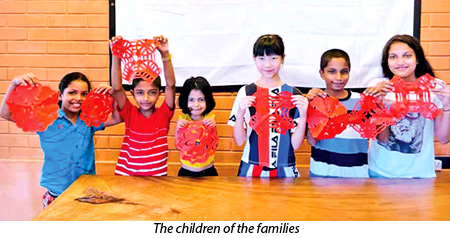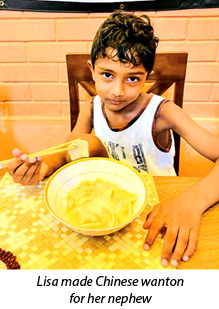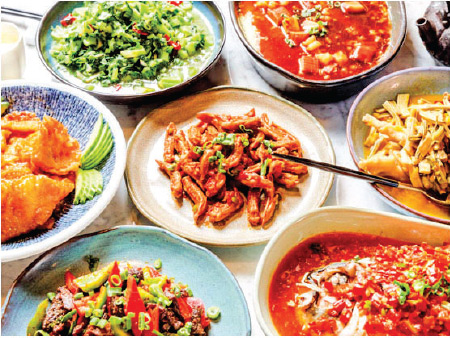
Lisa lives in Sri Lanka with her Sri Lankan husband, Kaminda. She is from Dalian City, in the northern part of China. Surrounded by the Yellow Sea, Dalian is one of China’s most beautiful cities. Similar to Sri Lanka, the clean air and early 20th century architecture attract the attention of international travellers.
 That’s why Sri Lanka gives Lisa a feeling of hometown. Living as an islander, Lisa is deeply interested in local tradition and culture. She found that Sri Lanka and China have many magical commonalities in culture and customs.
That’s why Sri Lanka gives Lisa a feeling of hometown. Living as an islander, Lisa is deeply interested in local tradition and culture. She found that Sri Lanka and China have many magical commonalities in culture and customs.
She said: “The people of China and Sri Lanka have been in contact with each other since ancient times. But geographically, my country China is in East Asia and my second hometown is in South Asia. Naturally, there will be many differences in daily life, such as food style, the way of drinking tea, and festival celebrations. There are ‘sameness’ and ‘Difference’.
 The diversity of cultures makes life more interesting, and we also learn from each other and experience each other’s habits.
The diversity of cultures makes life more interesting, and we also learn from each other and experience each other’s habits.
In the past two years, exports to the Chinese market has developed rapidly. Under the booming cross-border e-commerce, they registered the Ceylon tea brand Ayu Ceylon Tea and exported it to China, which was well commented by many Chinese customers. As for why this brand name was chosen?
The couple explained: “Ayu means life in Sinhalese. In Sri Lanka, when people greet each other, they say ‘Ayubowan’, which means ‘wish you long life’, We want to bring rich and beautiful life wisdom to the Chinese.”
Currently, they live in Ambalangoda, with their daughter, Miya, and her husband’s sister’s family. “Ambalangoda is a beautiful place with a good ecology. We will consider building a guest house in the future. I hope more Chinese will come to Sri Lanka after Covid and fall in love with this unique island,” she said.
The ‘sameness’ and the ‘difference’
 There is an old Chinese saying that “food is heaven”, which shows the importance of dining. Living in a foreign country, if you are not used to the local food, you would have big problems, but fortunately Lisa enjoys Sri Lanka food. “I love daily food like rice curry, Rotti, Kottu and Coconut Sambol; I also love festive food like milk rice, Kokis and Kevum,” she said.
There is an old Chinese saying that “food is heaven”, which shows the importance of dining. Living in a foreign country, if you are not used to the local food, you would have big problems, but fortunately Lisa enjoys Sri Lanka food. “I love daily food like rice curry, Rotti, Kottu and Coconut Sambol; I also love festive food like milk rice, Kokis and Kevum,” she said.
The husband also enjoys Chinese food. Their family cooks Chinese food occasionally. Kaminda has been to China many times with Lisa, and he is almost a Chinese food expert. The sister and two little nephews have never been to China, but because of Lisa, they all fell in love with the Chinese flavor. “They’ve learned to use chopsticks!
During festivals such as the Chinese Spring Festival, we make dumplings and eat hot pot together.”You see, food is also a special delicate bond for family affection.
Not only e-commerce, Sri Lanka and China are about 5,000 kilometres away in a straight line, but these two ancient countries have long established business ties through the Maritime Silk Road, as the island was a known maritime hub. One of the most popular commodities was tea. Today, this period of history can also be seen in daily lives: the people of both countries have a passion for tea.
Every morning, Lisa wakes up to the fragrance of black tea brewed by her sister. The way of drinking tea in Sri Lanka is more casual, adding sugar and milk, all depending on people’s own preferences. Daughter Miya has been able to accurately grasp the ratio of adding milk and sugar to make a delicious cup of Ceylon tea. Chinese generally pay more attention to the placement of the tea table as the old tradition, the choice of tea sets, the etiquette of drinking tea, etc.
“Sometimes we also use the Chinese bowl-shaped tea cups to brew Ceylon tea, which is a fun way to taste the mixed culture.” —— and also a taste of the oriental beauty from Sri Lanka and China.
Double joy
Sri Lanka has 12 full moon festivals each year, Poya Day, and there are two “Poya Days” in China - Lantern Festival on the 15th of January and the Mid-Autumn Festival on the 15th of August, both of which symbolize family reunion and the wishes of prosperity.
Lisa’s family enjoyed Poya Day in Sri Lanka. Lisa said: “I always go to temples with my husband and sister’s family, listening to monks’ talk and praying. We also offer alms. Full moon means reunion of people for Chinese. That is the moment I strongly miss my parents and friends far away in China. Fortunately now communication has become easy with the Internet. I make video calls to relieve my homesickness each time.”
For Sri Lankans, Sinhala and Tamil New Year is the most important festival, just as Spring Festival is for the Chinese. During the Sinhala and Tamil New Year, people prepare milk rice, light oil lamps at an auspicious time, and have a traditional dish feast.Spring Festival is the most important holiday in the Chinese calendar.
 It is usually a fifteen days celebration, starting on the evening before the first day of the first lunar month and ending with the Lantern Festival on the fifteenth day.
It is usually a fifteen days celebration, starting on the evening before the first day of the first lunar month and ending with the Lantern Festival on the fifteenth day.
In preparation for the Spring Festival, people clean their houses, have their hair cut, pay off debts and buy new outfits. The cleaning of the home is thought to rid it of bad spirits and bring good luck for the coming year. Houses are decorated with red paper scrolls with words (couplets). It’s a kind of literature.
Chinese people like to write some dual and concise words on red paper to express their new year wishes. On New Year’s Eve, the family gathers together and celebrates with a big meal just like Sri Lankans. During the Chinese Spring Festival, Lisa’s family also celebrates according to Chinese tradition. Cut the window grilles, write couplets, and cook reunion meals, as is her habit in China.
Sri Lanka is Lisa’s second hometown. She sincerely hopes that the people of both countries have a good life. In Kaminda’s eyes, now the family celebrates both Sri Lankan and Chinese festivals, so the joy has doubled. They said: “Happy Chinese New Year to everyone, and the coming Sri Lankan New Year!”
